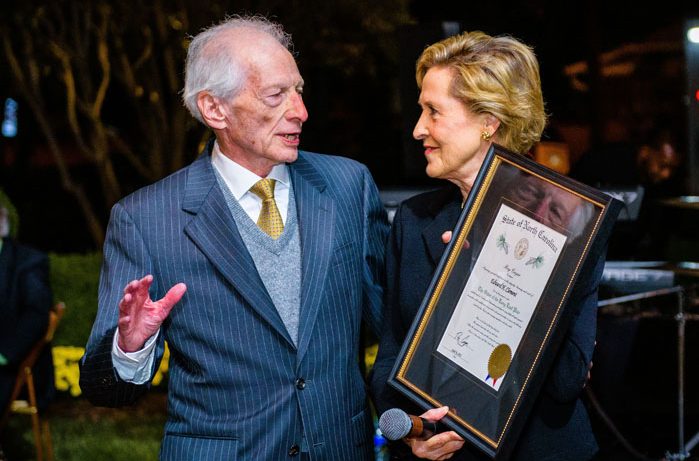Clement gets Order of Long Leaf Pine honor
Published 12:01 am Sunday, October 23, 2022

- Former Salisbury Mayor Susan Kluttz presents Ed Clement with the proclamation inducting him into The Order of the Long Leaf Pine. Photo by Studio 35.
By Pete Prunkl
Historic Salisbury Foundation
SALISBURY — On April 12, 1972, Ed Clement convened the charter meeting of Historic Salisbury Foundation in the second-floor meeting room at the 1855 Rowan County Courthouse. Now 50 years later, in appreciation for his efforts to preserve and protect the historic built environment of Salisbury and Rowan County, Gov. Roy Cooper awarded Ed Clement with North Carolina’s highest civilian honor, The Order of the Long Leaf Pine.
Former Salisbury Mayor Susan Kluttz presented the framed and signed certificate at the OctoberTour Patrons Party on Oct.9. It was an emotional moment for Clement and for the 350 benefactors at the event.
Since 1963, governors have bestowed the state’s most prestigious award on friends of North Carolina. All were nominated by local groups or individuals and evaluated by the governor’s staff. Members include Dale Earnhardt, Maya Angelou, Billy Graham and Doc Watson.
In her presentation, Kluttz called attention to a 1984 editorial in the Salisbury Post thanking Clement for his preservation accomplishments.
Kluttz, who served as secretary of the North Carolina Department of Cultural Resources under Gov. Pat McCrory, summarized the editorial. “But for Ed Clement’s determined and farsighted efforts,” she said, there might have been no Historic Salisbury Foundation, no revolving fund to save deteriorated historic buildings, no Bell Tower, no Wrenn House, no Hall House museum, no OctoberTour, no Grimes Mill, no John Steele House and no Historic Salisbury Railroad Station.
“In short,” she said, “no organized Historic Salisbury movement at all.”
In the late 1960s, Edward Henry Clement (b. 1932) turned the corner from concerned citizen to preservation activist and reshaped Salisbury’s destiny. He is responsible for planting the notion of historic preservation in the minds of public officials and the local citizenry and then nurturing, building and actualizing that vision into a civic identity. Throughout that process, Clement and other preservationists were regarded as saviors by many and as anti-progress by others. His response: “If we are universally loved, we are not doing our job.”
Clement would be the first to correct the impression that he played a central role in shaping that identity. One of his favorite sayings is, “Everything I do is a ‘we.’ You don’t do anything as an ‘I.’ ”
Clement’s other mantra for the past 50 years has been “Preservation is Progress” and he proclaimed that slogan when historic preservation had yet to be defined. Before Clement, Salisbury officials and many in state and federal government, believed in urban renewal, new construction and the demolition of old buildings for parking lots. The public believed that historic preservation was the job of museums.
During the Foundation’s hectic first three years, 1972-1975, Clement was recognized as a preservation leader locally, statewide and nationally. In 1975, he represented North Carolina on the Board of Advisors for the National Trust for Historic Preservation. Later in 1979, the United States Department of the Interior presented him with its National Cultural Achievement Award. One year after that, Clement served as chairman of the National Trust’s Board of Advisors and as chairman of the board of what is today Preservation North Carolina.
In 1987, Clement was named the Salisbury Post’s Newsmaker of the Year for efforts indirectly related to historic preservation. He chaired the Rowan Defense Fund, a group of attorneys and business leaders whose goal was to challenge the State of North Carolina in its attempt to locate hazardous waste sites in Rowan County. Clement and his colleagues met with members of the North Carolina Hazardous Waste Treatment Commission, organized citizen rallies, called and visited senators and representatives and prepared media kits and newspaper advertisements touting the fact that Rowan County did not want that type of facility.
Thanks to Clement and others, the county is free of such sites.
In 1988, after 16 years of negotiations, rallies, public hearings, rescues, fundraisers, surveys, purchases of endangered properties, home tours and zoning changes, the National Trust presented Clement with a well-deserved National Preservation Honor Award.
In her presentation, Kluttz said that in 1997, when she was first elected mayor, she inherited a city vastly different from the one of 1972. Then downtown Salisbury was practically a ghost town with boarded up windows and rusted aluminum facades. Twenty-five years later, “The city I represented was a jewel and the envy of other cities in the state,” she said. In 2012, when she left the City Council, Salisbury’s Downtown was named a Great American Neighborhood by the American Planning Association.
In accepting the award 50 years after the founding of Historic Salisbury Foundation, Clement insisted that he was not alone in achieving Salisbury’s fame as an historic city. Pointing to the 350 supporters at the Patron’s Party, he said, “You are Historic Salisbury Foundation.”
For more information about historic preservation, visit historicsalisbury.org or call 704-636-0103.



